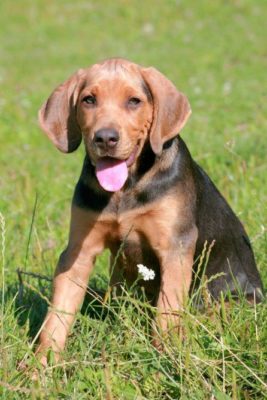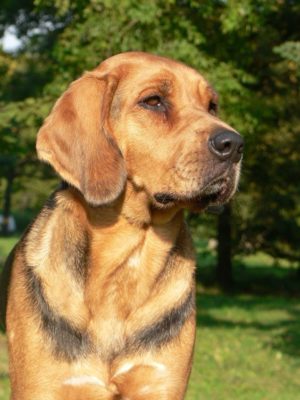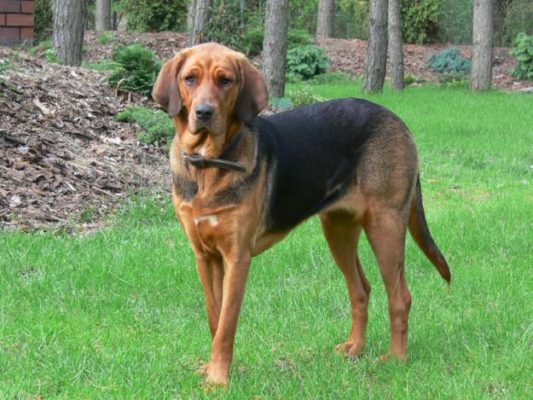Polish Hound
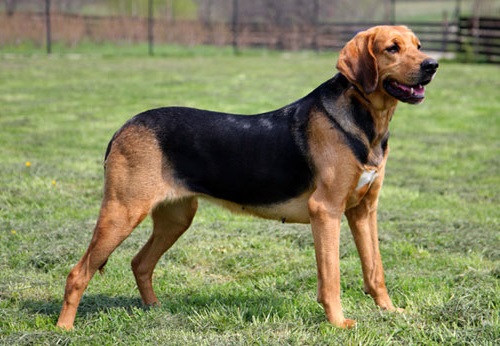
Polish Hounds are very reliable and gentle. The dog is also very difficult to drive to a state of anger. Polish Hounds have a reputation for being friendly, gentle, and affectionate to all family members. They are rarely aggressive, although they can defend themselves against people they don’t know. Polish Hounds are more likely to raise the alarm with enthusiastic barking than with outward aggression.
Table of Contents
Breed Information
| Another Name | Ogar Polski |
| Origin | Poland |
| Height | Males 56-65 cm Females 55-60 cm |
| Weight | Males 25-32 kg Females 20-26 kg |
| Fur | Short, smooth, with a dense undercoat |
| Color | Black and brown, black and red |
| Lifespan | 10-13 years |
| FCI Classification | Scent hounds and related breeds |
| Group | Dogs for hunting, dogs for kids |
| Price | From $300 |
Breed Photos
Origin History
The distant ancestors of the Polish Hounds hunted wild animals roaming the forests of Poland. There was no definite breed standard; it was rather a certain “type” of a dog with a good sense of smell and a strong build.
In the Middle Ages, sled dogs were crossed with local Polish Hounds to produce the Polish Hounds dogs. The numbers of these sturdy dogs did not suffer until the twentieth century. But after World War I, people became more interested in show dogs rather than animals for hunting.
With the show ring in mind, Colonel Josef Pawusiewicz revived the breed and set a new breed standard. These dogs had a slightly lighter backbone than the original Polish Hound and represent the breed as we know it today. This new standard was adopted in 1983 as the standard for the ideal Polish Hound.
Appearance
The Polish Hound is of medium height, but at the same time, is a powerful and hardy dog. These large athletic dogs have a wide, slightly wrinkled face. They also have heavy ears. The slightly wrinkled muzzle gives the dog a gentle expression, a middle ground between surprise and curiosity.
This dog is tall, with a broad chest, a trim waist, and a long low tail. It has a short, smooth double coat that is waterproof. The coat is usually two-tone, with acceptable brown and dark brown, black and brown, or brown and red. Males are 56-65 cm tall, and females are 55-60 cm tall. The standard weight range for male dogs is 25-32 kg and for bitches 20-26 kg.
Character
Polish Hounds are very reliable and gentle. The dog is also very difficult to drive to a state of anger. Polish Hounds have a reputation for being friendly, gentle, and affectionate to all family members. They are rarely aggressive, although they can defend themselves against people they don’t know. Polish Hounds are more likely to raise the alarm with enthusiastic barking than with outward aggression.
Among his qualities: excellent sniffing for scents and the ability to follow the trail, whether rain or shine. As you would expect from a dog with hunting roots, they need a lot of physical activity. Nevertheless, they are not an overly exuberant breed.
Thus, this breed is gentle and energetic. It needs a certain amount of space, so this breed is not ideal for an apartment but would make a great companion participate in active family life.
Care
The coat is mostly self-cleaning and requires little maintenance. However, a wise owner brushes the dog at least once a week to remove loose hair. The breed sheds moderately.
Avoid bathing your Polish Hound unless they get very dirty, as this will cause them to lose their natural protective skin secretions. The dog should be checked for ticks after every walk to keep it healthy.
An active dog rarely needs his nails trimmed, but he should be given close attention. Brushing your dog’s teeth daily is the key to long-term good health.
Training
The Polish Hound is an intelligent dog who likes to think he is always in charge. Thus, reward-based training fits well with his understanding and quickly gets him to do as he is told.
The breed can be slow to develop mentally and can keep its puppy-like moods longer than other breeds. It is especially important to be patient with this breed and not get angry if it loses focus.
Early socialization of the Polish Hound puppy is crucial. It helps the puppy become familiar with different sights, sounds, and smells and grow into a confident adult dog. As with any other dog, lack of early life experience can cause him to behave anxiously in new situations.
Again, like any dog, the Polish Hound values consistency during training. Make sure everyone in the family understands the rules and what the dog can and cannot do. Set clear boundaries, and this breed will do its best to obey them.
Common Diseases
Polish Hounds are very hardy dogs. They do not have any particular health problems. Although every active outdoor breed, particularly the Polish Hound, inevitably comes into contact with parasites and can get an infection. The dog’s digestive system should also be monitored to avoid stomach congestion.
Nutrition
This dog’s food should be balanced and full of vitamins. Only high-quality food is recommended, and the number of meals should depend on your dog’s activity level. He is very greedy but should still eat according to his workload.
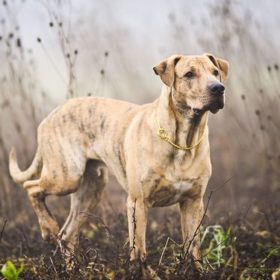 Cimarrón Uruguayo
Cimarrón Uruguayo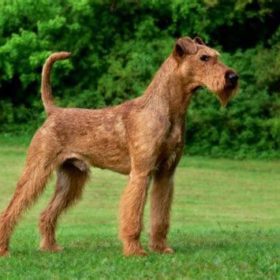 Irish Terrier
Irish Terrier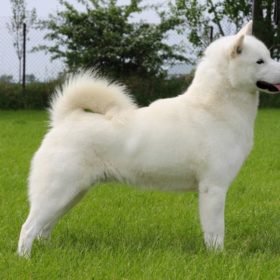 Kishu
Kishu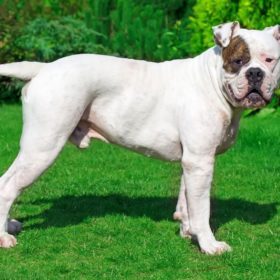 American Bulldog
American Bulldog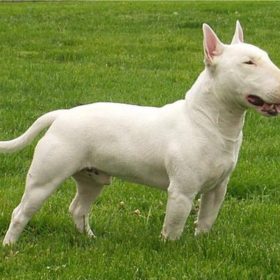 Bull Terrier
Bull Terrier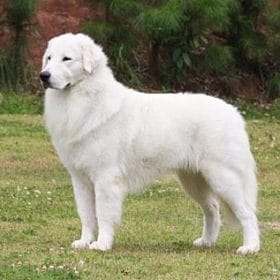 Maremmano-Abruzzese Sheepdog
Maremmano-Abruzzese Sheepdog